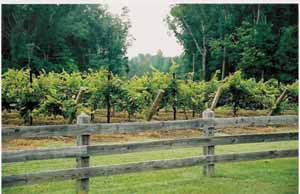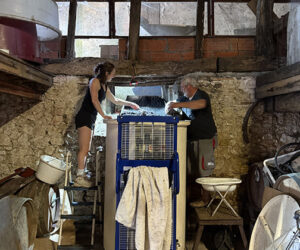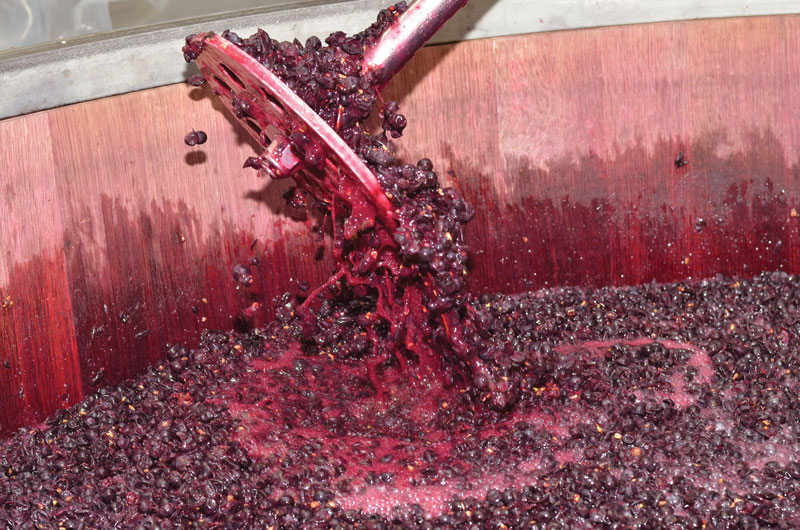
The first year Tam Cloer experimented with planting grapevines on his 18-acre property in Apex, North Carolina — just southwest of Raleigh, the state’s capital — a late spring frost killed every single vine. But Tam, short for Thomas, doesn’t discourage easily.
“I waited and learned a lesson about it and came back and planted again the next year,” he says easily. Twelve years have passed since that first planting, and today he and wife Pam have nearly 3,000 healthy vines growing in their home vineyard.
Learning the land
The family vineyard isn’t the family business, however. Pam, 37, is a stay-at-home mom to the couple’s two young daughters. Tam, 38, works at Cloer Nursery in Apex, started by his parents in 1979. The vineyard, says Tam, is a hobby that simply grew in huge proportions—perhaps even a little crazily.
Primarily, the Cloers grow three types of grapes — two red, one white. The reds are a French hybrid called Chambourcin and Cabernet Franc and the white is Seyval Blanc.
In addition to the thousands of vines growing in the vineyard, the Cloers have two 256-gallon stainless steel fermenting tanks in a small barn-like shed behind their house. Each season, family and friends gather at the Cloer’s remodeled farmhouse, built in 1914, to bottle the wine that ages in a wooden barrel for an average of 14 months. The Cloers usually give away most of the 360 bottles as holiday gifts or for other occasions. As it turns out, they’re not huge wine drinkers.
“We like wine and drink wine, but I’m not a connoisseur,” Tam says. “I couldn’t sit down and do blind tastings, but I can tell you about the anatomy of the grapes. We like this more for the agricultural aspect, more from the farming standpoint.”
Tam, a graduate of North Carolina State University with a BS in horticulture, is especially intrigued by figuring out what will grow well in the local climate and soil. “An ideal growing environment for a grape is a very hot day followed by a very cool night,” says Tam. “And here we don’t have cool nights. So the complexity and structure of the grape can come apart a little bit. However, the way science has evolved the last 15 or 20 years, just in agricultural research, you’ve got chemicals and you’ve also got clones — varieties of plants that actually thrive under certain conditions.”
The varieties Tam plants tolerate the heat and mildews of North Carolina. While the quality of the California climate is hard to match, North Carolina is quite kind to certain types of grapes.
Hard work
Growing grapes is not a weekend pastime or a lazy man’s hobby. When asked how much work it requires, Tam says, “Let me put it this way. Your wine is made in your vineyards. There are no shortcuts.”
Tam and a Cloer Nursery employee, Sabino Soliz, start tending the vineyards in March, pruning for about two weeks, cleaning up and then setting trellis wires. The summer months are especially busy, and the two men often work the vineyards three days a week, pruning, spraying, and thinning the vegetation, which is necessary if heavy rains cause an overgrowth and prevent the fruit from getting adequate sun. Harvesting generally takes place in September or October. Then the process moves inside.
The grapes bring family and friends together—whether in planting, harvesting or bottling.
Enjoying it
When the Cloers bought their property in Apex, the farmhouse was hard to find, with a winding dirt road providing the only access. Subdivisions were scarce, and the only grocery store was several miles away. A lot has changed.
“We couldn’t afford to buy this out here now, believe it or not,” Tam says. “It’s gotten a lot more expensive over the last five or six years. When they paved this road about six years ago, that actually increased the values of the properties out here.”
But the Cloers have no plans of moving. They’re doing just what they’ve always wanted.
“There’s no big business plan. Pam and I have always just wanted to enjoy it,” Tam says. “It’s just a hobby. We had the land, and I wanted to plant some grapes. We really have God to thank for the opportunity.”







